On December 8, fourteen instructors and staff from the four larger language departments gathered in Jones 35 to participate in the one-day conference held at the University of Pennsylvania, entitled Advancing Language Education Beyond the Classroom. The group heard streaming presentations from Marie-Noelle Lamy in the United Kingdom, Daphne Koller in California, and Carl Blyth in Texas, along with a number of panel presentations at the conference site in Philadelphia.
Presenters shared their experiences with completely online language learning in the United Kingdom, and the inexpensive options of MOOCs and Open and freely accessible learning materials. Instructors from U Penn shared their experiences with the Coursera system and with teaching completely online language courses. Our group in Minnesota had the opportunity to view and participate in the presentations and we were able to discuss among ourselves options and possibilities for online language learning here at the University of Minnesota. In all, it was an excellent experience, opening up new possibilities for accessing current and evolving technologies in the service of teaching and learning languages.
Friday, December 21, 2012
Tuesday, December 18, 2012
Free Six-Week Course for Spring Semester: Teaching a Hybrid Language Course
As language courses here at the university and across the country shift towards a blend of face-to-face and online instruction, many teachers find themselves in unfamiliar territory. They've worked for years developing strategies and techniques for the traditional classroom, but have little experience as either a student or an instructor in the online environment.
The CLA Language Center is pleased to announce a 6-week seminar on teaching a hybrid language course during Spring Semester 2013. The seminar will be offered in a hybrid format, with both online components and three face-to-face sessions from February 1 to March 14, 2013.
The face-to-face sessions held on Fridays, 11:15-12:05pm in Jones 35 on the following dates:
Topics to be addressed include:
Look for more information and registration forms in January!
The CLA Language Center is pleased to announce a 6-week seminar on teaching a hybrid language course during Spring Semester 2013. The seminar will be offered in a hybrid format, with both online components and three face-to-face sessions from February 1 to March 14, 2013.
The face-to-face sessions held on Fridays, 11:15-12:05pm in Jones 35 on the following dates:
- February 8
- February 22
- March 8
Topics to be addressed include:
- Getting into the course (course preparation, introductions, syllabus)
- Building Community (starting and maintaining discussions, fostering student peer support)
- Blending the Course (integration of online activities into face-to-face content and activities)
- Student Time Management and Coaching
- Assessment and Feedback
Look for more information and registration forms in January!
Monday, December 10, 2012
World Languages Day Application of Interest
World Language Day (WLD) planning continues to go forward and beginning January 14, 2013 high school teachers will have the opportunity to register their interest by submitting an Application of Interest to attend the tenth annual event.
WLD is an opportunity for Minnesota high school students to explore some of the languages and cultures of the world and to experience academics at the University of Minnesota. This year, the event is intended for sophomore-level language classes and all students in those classes may attend, even if they are not sophomores. Teachers, counselors and parents are also invited to attend.
There is no cost to attend and the feedback provided last year by attendees was enthusiastically positive.
The event is scheduled for Tuesday, May 21, 2013. This year, the itinerary has changed to ensure that all students are able to register for three language and culture classes. We are offering a Standard Schedule, which includes three language and culture classes and an Extended Schedule, which includes three language and culture classes, along with the choice of an additional informational class.
STANDARD SCHEDULE
9:20 - 9:50 AM Check in, Breakfast
10:00 - 10:25 AM Welcoming Remarks
10:35 - 11:15 AM First Class
11:25 AM - 12:05 PM Second Class
12:15 - 12:55 PM Third Class
EXTENDED SCHEDULE
8:30 - 9:00 AM Check in, Breakfast
9:10 - 9:40 AM Welcoming Remarks
9:45 - 10:25 AM Informational Class
10:35 - 11:15 AM First Class
11:25 AM - 12:05 PM Second Class
12:15 - 12:55 PM Third Class
The three informational classes to choose from are:
Between Jan. 14 and Jan. 31, 2013, teachers will have the opportunity to submit an Application of Interest, which is the first step toward bringing a group of students to the event. The application will be available at the WLD website.
Teachers who have not received an email with the username and password may request this information by signing up for the WLD email list.
Shortly after January 31, the planning committee will review all applications and invite teachers representing a total of 850 students. If more teachers submit applications than the event can accommodate, the planning committee will select which groups to invite. The goal will be to bring as much geographic, linguistic, and cultural diversity to the event as possible. The committee will also consider the teacher's reason for wishing to bring their group to the event. Any groups that we are not initially able to accommodate will be placed on a wait list.
The Language Center and the WLD planning committee are excited about offering this event again and hope to see a mix of new and returning schools on May 21, 2013. Please see the WLD site for updates on the event.
WLD is an opportunity for Minnesota high school students to explore some of the languages and cultures of the world and to experience academics at the University of Minnesota. This year, the event is intended for sophomore-level language classes and all students in those classes may attend, even if they are not sophomores. Teachers, counselors and parents are also invited to attend.
There is no cost to attend and the feedback provided last year by attendees was enthusiastically positive.
The event is scheduled for Tuesday, May 21, 2013. This year, the itinerary has changed to ensure that all students are able to register for three language and culture classes. We are offering a Standard Schedule, which includes three language and culture classes and an Extended Schedule, which includes three language and culture classes, along with the choice of an additional informational class.
STANDARD SCHEDULE
9:20 - 9:50 AM Check in, Breakfast
10:00 - 10:25 AM Welcoming Remarks
10:35 - 11:15 AM First Class
11:25 AM - 12:05 PM Second Class
12:15 - 12:55 PM Third Class
EXTENDED SCHEDULE
8:30 - 9:00 AM Check in, Breakfast
9:10 - 9:40 AM Welcoming Remarks
9:45 - 10:25 AM Informational Class
10:35 - 11:15 AM First Class
11:25 AM - 12:05 PM Second Class
12:15 - 12:55 PM Third Class
The three informational classes to choose from are:
- So You Want to Be A Millionaire: How Preparing for College Can Help!
- U of M Admissions: The Inside Scoop
- Where in the World will U Go? Study Abroad as a College Student
Between Jan. 14 and Jan. 31, 2013, teachers will have the opportunity to submit an Application of Interest, which is the first step toward bringing a group of students to the event. The application will be available at the WLD website.
Teachers who have not received an email with the username and password may request this information by signing up for the WLD email list.
Shortly after January 31, the planning committee will review all applications and invite teachers representing a total of 850 students. If more teachers submit applications than the event can accommodate, the planning committee will select which groups to invite. The goal will be to bring as much geographic, linguistic, and cultural diversity to the event as possible. The committee will also consider the teacher's reason for wishing to bring their group to the event. Any groups that we are not initially able to accommodate will be placed on a wait list.
The Language Center and the WLD planning committee are excited about offering this event again and hope to see a mix of new and returning schools on May 21, 2013. Please see the WLD site for updates on the event.
Spanish 1004 LPE: Reading, Listening and Writing Now Completely Online
The Language Proficiency Exam (LPE) is integrated into the fourth-semester courses of many languages. Students in fourth-semester Spanish take the reading, listening and writing portions of the LPE during regular class periods, and beginning Fall 2012, they are the first language classes to take the three parts of the LPE online. Until now, the LPE reading and listening have been taken online as the final exam. However, the LPE writing test was still on paper in the students' classroom. The writing section is rated by instructors, whereas the the reading and listening sections are computer-graded.
Last week all students in Spanish 1004, 1014, and 1044 came to Jones Hall during a regular class period to take the LPE writing test online in one of the computer labs. This change is possible due to upgrades to the online LPE delivery system that allow students' exams to be linked to a specific course section. This means for example, that all exams taken by Spanish 1004-006 students can be linked for grading purposes. When the new system is fully implemented, instructors will be able pull up student exams by section through the grader interface and evaluate the individual tests.
Last week all students in Spanish 1004, 1014, and 1044 came to Jones Hall during a regular class period to take the LPE writing test online in one of the computer labs. This change is possible due to upgrades to the online LPE delivery system that allow students' exams to be linked to a specific course section. This means for example, that all exams taken by Spanish 1004-006 students can be linked for grading purposes. When the new system is fully implemented, instructors will be able pull up student exams by section through the grader interface and evaluate the individual tests.
Wednesday, December 5, 2012
TandemPlus & Small World Coffee Hour Event
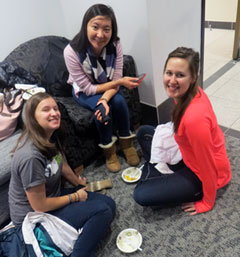
This past Friday, November 30, Tandem Plus co-hosted the biweekly Small World Coffee Hour event from 4-6 p.m. in Yudof Hall to promote student engagement, language learning, and cultural diversity.
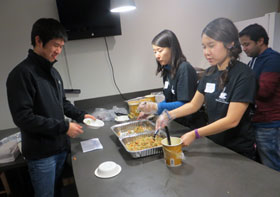
The theme was "Americana" and refreshments included traditional American goodies like sweet corn, stuffing, and cookies, plus coffee and tea.
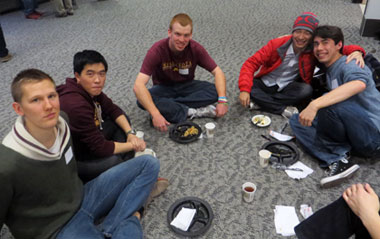
TandemPlus presented a short movie about Tandem, and student TandemPlus participants put on humorous short skits showing what a Tandem partnership should (and should not) be.
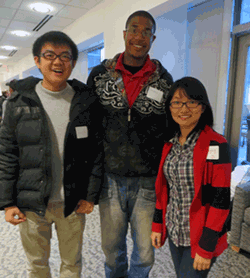
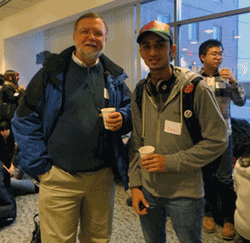
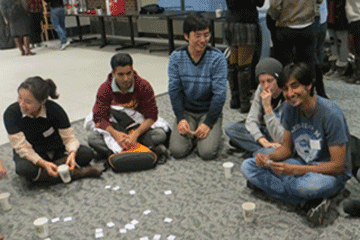
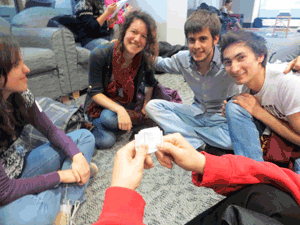
This was Tandem's final group get-together of the fall semester and was a great way to wrap up the semester.
Thursday, November 29, 2012
Hybrid Language Courses Expand
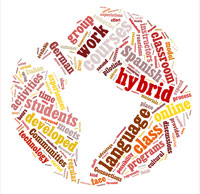
Hybrid language courses, made up of both online and classroom-based instruction, are growing at the University of Minnesota. French and Spanish are piloting refined second-year hybrid courses this semester, while German is piloting its first ever hybrid class this fall in 1003.
Spanish was the first to offer hybrid courses, starting with 1022 over a decade ago. Concentrated efforts to expand hybrid course development began in 2011, when Spanish created hybrid options for 1003 and 1004 and French piloted a hybrid version of 1004.
A Hybrid Working Group was formed during the Spring 2012 semester. It includes representatives from French, German, Italian, Spanish, the Language Center, CARLA and CLA-OIT. The goals of this group are to share resources, compare experiences and learn from one another without producing identical classes for various language programs.
The group worked diligently over the summer and continues to meet this semester. Meetings typically feature at least one technical training and exploration opportunity.
The new hybrid courses address the five national standards for foreign language learning, known as the "Five C's": Communication, Cultures, Comparisons, Connections, and Communities.
I sat down with Dan Soneson, coordinator of the Hybrid Working Group and spokesperson for ComSLE, to learn more about hybrid courses and the process of the work group's collaboration.
Saoirse: How are hybrid courses adjusted/customized to suit different languages? Is there a specific model for the ideal hybrid course?
Dan: It would be great if there were one model out there that we could all adopt, but the concept of a hybrid course has developed over time and only recently have we begun to think about actually replacing class time with time online. We started the process looking at how Spanish 1022 works, and went from there.
We quickly discovered that the amount and quality of prepared online resources available to Spanish is not as readily available to the other language programs, so French, German and Italian had to find and develop more of their own materials. While Spanish had begun with the intensive elementary course, both the French and German programs decided to start at the second year. The reasoning was that by the second year students have experience with the language and might be able to work more independently in a partially online context.
Saoirse: Will hybrid courses expand to more languages and levels in the future? Are there any more languages that may be experimenting with hybrid?
Dan: That will depend on the success of these newly developed courses. The original plan was to have blended learning or hybrid courses in place for at least semesters two through four of Spanish, German, French, and possibly Italian. If we can solidify the models we develop for these languages, perhaps they can serve as templates for related language programs.
Saoirse: Do you think a hybrid model would work with upper division language courses?
Dan: I definitely think a hybrid model can work throughout the curriculum. A great deal depends on what kinds of activities can be developed to take advantage of the wealth of material and communication possibilities that technology provides.
Saoirse: What are student's reactions to these new courses? Instructor's reactions?
Dan: As you can imagine, reactions have been mixed. One thing we've learned is that students discover quickly that this course involves more work than a strict face-to-face class, even though the expected time commitment is equivalent. While it may be possible to participate less in a face-to-face class, online you need to do all the work and demonstrate your participation. This work, however, can yield greater results, since everyone is participating equally.
Instructors also note the increased workload, primarily due to reading and responding to every student's contributions to forum topics and threaded discussions. However, regular classroom participation can increase as well. One instructor stated recently that once the class gets into the rhythm of online work leading to live classroom activities, the quality of the classroom work improves, with more engaged students and more stimulating discussions.
Saoirse: What are the expectations of a hybrid course? What are the characteristics of a student who will be successful in a hybrid course?
Dan: Basically, a hybrid course represents a transformation from a conventional course that meets exclusively in a physical space (a classroom) to one in which a regular number of classroom hours take place online or through use of technology. In our case, the conventional 5-credit course meets regularly at the same hour, five days each week. The hybrid version reduces the physical in-class hours to three each week, while the other two hours take place virtually, with students engaged with similar activities or with the kind of activities that are desirable, but difficult to accomplish in a large class setting.
The expectation is that these online "classes" carry the same weight as a regular in-class meeting, and that students spend at least 50 minutes focussing on the assigned activities, at a time that is convenient for them. In addition to these online activities, students also complete regular homework assignments for each class period, whether it is virtual or face-to-face.
Successful students are well organized self-starters who can work independently and are willing to work with peers outside of the classroom. Much of the "group" work that takes place in the virtual classroom requires teamwork and an ability to contribute to a discussion in a timely manner.
Saoirse: What are some things the Hybrid Work Group achieved over the summer? What kind of technology were instructors trained on?
Dan: The Work Group met weekly over the summer to share ideas and experiences. The idea was to provide both structure and a support system for all instructors working on the process. We had people from CLA-OIT participate and share technologies in an effort to help the instructors develop activities and format the courses. We experienced the capabilities of Moodle, Kaltura, UMConnect, Google Hangouts, TurnItIn, and Avenue.
One of the major opportunities that I see for hybrid courses is the ability to pair our students with speakers of the language they are learning. Our TandemPlus program is developing connections with institutions abroad, and ideally we can connect our learners with learners of English to engage in mutually beneficial regular exchanges in which each participant has an opportunity to discuss cultural issues with a partner in the target language.
Once we have these networks firmly established, our students could spend 50 minutes online with a language partner instead of in class. The possibility of using the language in meaningful communication in 50 minutes is much greater in this situation than in a large class. There is still much work to be done to bring these internet exchanges about in a regular manner, but it would be an excellent activity taking full advantage of what internet technology has to offer. Pilot programs are already underway in French, Spanish, German and Italian.
Saoirse: Is there anything else you would like to add about hybrid language courses in general?
Dan: This hybrid development process provides a great opportunity to rethink our language programs, to take advantage of the wealth of authentic materials available on the internet and the wonderful capabilities of Computer Mediated Communication, such as threaded discussions, chat, voice chat, and teleconferencing. You mentioned the National Standards above. We have an excellent opportunity now to address all five C's through technology, exploring Cultures, Connecting to disciplinary content, drawing Comparisons through in-depth experience of cultural practices and perspectives, and providing access to a vast array of Communities that function in the target language on the Web.
This is the first in a series of articles planned on hybrid course development. Look for future blog entries concentrating on hybrid courses for Spanish, French and German.
Wednesday, November 21, 2012
Annotated Film Clips Now Available
Using authentic video in language teaching has always been an engaging, enriching, and pedagogically sound use of technology. Now thanks to the University of Minnesota's participation in a UC-Berkeley library initiative, it's even quick and easy too!
Playing short film clips in the second-language classroom or sharing them outside of class can be a simple and efficient way to demonstrate a linguistic function, introduce new vocabulary, show a cultural setting and much more! Short clips allow an instructor to get immediately to the relevant point and watching an interesting clip from a target language film can be culturally enriching for students.
Unfortunately, anyone who has ever located and digitized film clips for class will attest that this work can be labor-intensive. Either the clips need to be prepared well in advance of a class or you cannot use them at all.
The Language Center, on behalf of the College of Liberal Arts is proud to introduce a new resource for University of Minnesota language, culture and film instructors. Our university is now one of several participants in the Berkeley Language Center's Library of Foreign Language Film Clips (LFLFC). This web-based collection features high quality tagged and structured clips from a wide-range of foreign language films. Many clips offer optional subtitles.
Films with tagged clips are currently available in the following target languages: Arabic, Chinese, Finnish, French, German, Hindi, Italian, Japanese, Korean, Norwegian, Polish, Portuguese, Russian and Spanish. If your language is not available, check back! New content is constantly being added. Films in the library include classic and modern films such as Raise the Red Lantern, Caché, Xala, Bella Martha, City of God, Burnt by the Sun and Y Tu Mamá También. Berkeley does not provide a public list of all films available through the LFLFC, but clips are available from close to 350 feature films. The number of clips per film varies considerably, but for most films there are more than ten individual clips available.
Because the database is searchable by both keyword and target-language vocabulary, an instructor can quickly select clips based on the particular instructional topic of the day and play or share an existing annotated clip. For instance, a French instructor looking for examples of introductions can choose from thirty-seven clips. A good choice to consider might be the clip named "Introductions" from Entre les Murs, which has the description "Old and new faculty introduce themselves in a summer meeting prior to the start of classes." The work to find the right video clip is almost done before you've even hit play on a single film.
Some clips even come complete with educational materials. Instructors can also upload and share their own lesson plans for particular clips.
Since the U of M is now a participating university in the LFLFC, all U of M language and culture instructors now have access to these tagged and structured clips for their own classes. There is a catch: in accordance with U.S. copyright law, U of M instructors only have access to those clips in the LFLFC from films for which a university department at the U of M has purchased a physical DVD. This means that instructors can access films owned by the Language Center, CSCL, the Smart Learning Commons and the East Asian Library. Instructors who register with the LFLFC will only see those film choices. As other films in the LFLFC are purchased by university departments, they will be added to the options available for university instructors.
Film clips that instructors request are available for up to two weeks. Instructors can "reserve" the same film clip more than once, so it is possible to use a clip several times.
There is a two-step process to access the LFLFC: first apply for an account at the Berkeley site, second, email elsie@umn.edu and request approval of your application. You must register both with Berkeley and with the Language Center. The sooner you sign up, the sooner you can begin easily integrating short film clips into your class!
Playing short film clips in the second-language classroom or sharing them outside of class can be a simple and efficient way to demonstrate a linguistic function, introduce new vocabulary, show a cultural setting and much more! Short clips allow an instructor to get immediately to the relevant point and watching an interesting clip from a target language film can be culturally enriching for students.
Unfortunately, anyone who has ever located and digitized film clips for class will attest that this work can be labor-intensive. Either the clips need to be prepared well in advance of a class or you cannot use them at all.
The Language Center, on behalf of the College of Liberal Arts is proud to introduce a new resource for University of Minnesota language, culture and film instructors. Our university is now one of several participants in the Berkeley Language Center's Library of Foreign Language Film Clips (LFLFC). This web-based collection features high quality tagged and structured clips from a wide-range of foreign language films. Many clips offer optional subtitles.
Films with tagged clips are currently available in the following target languages: Arabic, Chinese, Finnish, French, German, Hindi, Italian, Japanese, Korean, Norwegian, Polish, Portuguese, Russian and Spanish. If your language is not available, check back! New content is constantly being added. Films in the library include classic and modern films such as Raise the Red Lantern, Caché, Xala, Bella Martha, City of God, Burnt by the Sun and Y Tu Mamá También. Berkeley does not provide a public list of all films available through the LFLFC, but clips are available from close to 350 feature films. The number of clips per film varies considerably, but for most films there are more than ten individual clips available.
Because the database is searchable by both keyword and target-language vocabulary, an instructor can quickly select clips based on the particular instructional topic of the day and play or share an existing annotated clip. For instance, a French instructor looking for examples of introductions can choose from thirty-seven clips. A good choice to consider might be the clip named "Introductions" from Entre les Murs, which has the description "Old and new faculty introduce themselves in a summer meeting prior to the start of classes." The work to find the right video clip is almost done before you've even hit play on a single film.
Some clips even come complete with educational materials. Instructors can also upload and share their own lesson plans for particular clips.
Since the U of M is now a participating university in the LFLFC, all U of M language and culture instructors now have access to these tagged and structured clips for their own classes. There is a catch: in accordance with U.S. copyright law, U of M instructors only have access to those clips in the LFLFC from films for which a university department at the U of M has purchased a physical DVD. This means that instructors can access films owned by the Language Center, CSCL, the Smart Learning Commons and the East Asian Library. Instructors who register with the LFLFC will only see those film choices. As other films in the LFLFC are purchased by university departments, they will be added to the options available for university instructors.
Film clips that instructors request are available for up to two weeks. Instructors can "reserve" the same film clip more than once, so it is possible to use a clip several times.
There is a two-step process to access the LFLFC: first apply for an account at the Berkeley site, second, email elsie@umn.edu and request approval of your application. You must register both with Berkeley and with the Language Center. The sooner you sign up, the sooner you can begin easily integrating short film clips into your class!
Tuesday, November 20, 2012
TandemPlus Roundup!
TandemPlus is pleased to announce that it has had a very successful fall semester! There was an approximate total of 481 language partnerships through Tandem's Face-to-Face Exchange program. The most popular language partnerships were Chinese seeking English, English seeking Spanish, and Arabic seeking English. There was also an exciting amount of Korean/English partnerships this year. It was a great fall semester and we are eager to start spring semester off on the right foot. Registration for TandemPlus this spring semester is expected to open during the first week of classes (late January).
Wednesday, November 14, 2012
Update from Jenise Rowekamp, Former Language Center Director
Jenise Rowekamp, the former Language Center Director and instructor in the Minnesota English Language Program, is now in Sri Lanka serving as a Senior English Language Fellow at the University of Ruhuna in Matara, which is on the southernmost tip of Sri Lanka.
She and her partner Margaret have a blog. You can follow their adventures in Sri Lanka, and see lots of beautiful pictures of the local sites and wildlife (including both of them riding an elephant) at http://margaretjenise.blogspot.com.
She and her partner Margaret have a blog. You can follow their adventures in Sri Lanka, and see lots of beautiful pictures of the local sites and wildlife (including both of them riding an elephant) at http://margaretjenise.blogspot.com.
Tuesday, November 6, 2012
World Languages Day International Music Playlist
Have a favorite non-English language song? Now's your chance to share it! The World Languages Day team is currently working on an international music playlist for the event. Music will play while students are waiting for the welcoming remarks and at other transitional times. We are looking for songs that are in a second language, and are modern, upbeat, interesting and relatively short (less than five minutes). The lyrics should be in a language other than English and appropriate for high school students. In particular, we are looking for additional song suggestions for Arabic, Dutch, Italian, Japanese, Korean, Norwegian and Russian, but all ideas will be considered. Please email wld@umn.edu with the name of the song, artist, language and purchasing information. All songs must be available for digital purchase in the United States.
Monday, November 5, 2012
TandemPlus Punch Pizza Party a Success!
We are pleased to say that the TandemPlus Pizza Party at Punch Pizza in Dinkytown on Friday, November 2 was a great success! Approximately 40 people showed up, enjoying pizza and great company while playing conversation games such as Taboo in Spanish, Korean, Chinese, and English. The next TandemPlus event is Small World Coffee Hour on November 30. Stay tuned for more details.
Thursday, October 25, 2012
The LPE Changes with the Times
The Language Testing Program now offers computerized Language Proficiency Exams (LPEs) in more languages than ever before. Tests currently in development feature culturally-rich authentic source material such as clips from modern Korean film, a look at the Somali-speaking community in the Twin Cities, and much more!
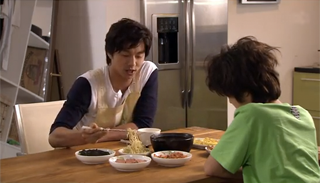
Example of culturally authentic material that could be used in LPE
Computerized LPEs were established in 2001. Hundreds of language students take them each semester to fulfill the College of Liberal Arts (CLA) language requirement and as a gateway to advanced language study. The mission of the Language Testing Program has remained constant: to accurately assess students' ability to listen, read, write and speak in the target language.
However, the program has changed and grown since 2001. The LPE is constantly being improved and the pace of modernization and innovation has picked up in the last few years. The Language Testing Program has focused on two new goals since 2010: to serve as many language students as possible and to improve the students' exam experience by including contemporary and diverse media from the target language culture.
Before 2010, a computerized test was available only for students of French, German and Spanish and a few related languages. Students of Asian and other less commonly taught languages were limited to paper-based tests, or had no exam options at all.
Tests are now in place for Arabic, Chinese, Hmong, Italian, Japanese and Russian, and there is a second version of the Spanish LPE. In addition, development is underway for Finnish, Korean, Somali, and Swahili. All of these tests were made possible through an influx of funding from Title VI and other sources, along with a committed effort on the part of the Language Testing Program and the individual language programs to work together tirelessly and collaboratively. Once all of the newer exams are completed, the LPE will be available for almost all non-Classical languages offered in CLA and will reflect the diversity of languages available at the University of Minnesota.
As new tests are created, the Language Testing Program and the developers aim to bring new depth to the student experience and to conform more closely to current trends in second language pedagogy with increased emphasis on culturally-rich contexts. The new exams retain the original LPE goal of validating the work of students in their four semesters at the university by providing an opportunity to show what they can do with the target language in a communicative context.
However, they are not just tests - they are also learning opportunities for students, highlighting something new about the culture, history, or people of the target language through the use of authentic materials. Students may learn, for example, how traditional holiday celebrations have changed over time as societies become increasingly multicultural. There are also explorations of how gender roles have shifted and how these shifts impact language as well as cultural practice. One exam features an innovative, and perhaps surprising, environmental initiative. Another explores the lyrics of a popular song from a YouTube video.
The piloting process for new LPEs often includes a survey of student opinions about the test. Reactions to the new authentic content have been overwhelmingly positive. Test-takers have said that they were surprised and pleased to see that they had no difficulty reading texts that they might encounter on a daily basis in the target culture.
The Korean LPE also offers a significant technological innovation: the incorporation of authentic video segments into the listening section. The test includes five diverse clips from modern Korean film showing natural and interesting interactions between native speakers. The use of authentic video is an excellent platform from which to assess listening proficiency, since it ties closely to the construct of listening in a communicative context, where meaning is negotiated based on a variety of input sources. The Korean listening exam has already been piloted once, and the response to the test was enthusiastically positive. Students reported that they especially enjoyed the video segments and felt confident that they could understand content overall, even though there may have been a few words unfamiliar to them.
The Somali listening section will include some authentic video segments as well. This exam stands out because it is set locally and explores the lives of immigrants integrating with the larger community as they share their language and culture - a reflection of the changing face of the Twin Cities.
Since 2010, new LPE creation has been led by Gabriela Sweet, who has worked tirelessly to organize a rotating team of developers, coordinate with multiple departments and stakeholders, and keep all projects on time and moving forward. The Korean, Somali, and Swahili development teams also include Language Center AV Developer Alaina Witt, Item Reviewers Xinyi Wu and Meghan McFadden, and LC Technical Coordinator Diane Rackowski.
Much of the funding for Korean development has been provided by a CLA InfoTech Tools for Discovery Grant. Title VI funding managed by the Institute for Global Studies has provided some travel and development grants for Somali and Swahili.
The Language Testing Program and the Department of Asian Languages and Literatures plan to present the new Korean listening section featuring authentic video later this winter. The U of M language community will have an opportunity to see how the classic LPE format can be modernized with technology to provide students with an educational, culturally-rich, and even enjoyable testing experience.

Example of culturally authentic material that could be used in LPE
However, the program has changed and grown since 2001. The LPE is constantly being improved and the pace of modernization and innovation has picked up in the last few years. The Language Testing Program has focused on two new goals since 2010: to serve as many language students as possible and to improve the students' exam experience by including contemporary and diverse media from the target language culture.
Before 2010, a computerized test was available only for students of French, German and Spanish and a few related languages. Students of Asian and other less commonly taught languages were limited to paper-based tests, or had no exam options at all.
Tests are now in place for Arabic, Chinese, Hmong, Italian, Japanese and Russian, and there is a second version of the Spanish LPE. In addition, development is underway for Finnish, Korean, Somali, and Swahili. All of these tests were made possible through an influx of funding from Title VI and other sources, along with a committed effort on the part of the Language Testing Program and the individual language programs to work together tirelessly and collaboratively. Once all of the newer exams are completed, the LPE will be available for almost all non-Classical languages offered in CLA and will reflect the diversity of languages available at the University of Minnesota.
As new tests are created, the Language Testing Program and the developers aim to bring new depth to the student experience and to conform more closely to current trends in second language pedagogy with increased emphasis on culturally-rich contexts. The new exams retain the original LPE goal of validating the work of students in their four semesters at the university by providing an opportunity to show what they can do with the target language in a communicative context.
However, they are not just tests - they are also learning opportunities for students, highlighting something new about the culture, history, or people of the target language through the use of authentic materials. Students may learn, for example, how traditional holiday celebrations have changed over time as societies become increasingly multicultural. There are also explorations of how gender roles have shifted and how these shifts impact language as well as cultural practice. One exam features an innovative, and perhaps surprising, environmental initiative. Another explores the lyrics of a popular song from a YouTube video.
The piloting process for new LPEs often includes a survey of student opinions about the test. Reactions to the new authentic content have been overwhelmingly positive. Test-takers have said that they were surprised and pleased to see that they had no difficulty reading texts that they might encounter on a daily basis in the target culture.
Here are some sample student reactions:
It made me realize the potential of a real-life usage for the language I've been studying.
I liked that the readings were all things I'd have to figure out in real life. It was a very pleasant experience to read articles from Japan.
I liked that the readings were all things I'd have to figure out in real life. It was a very pleasant experience to read articles from Japan.
The Korean LPE also offers a significant technological innovation: the incorporation of authentic video segments into the listening section. The test includes five diverse clips from modern Korean film showing natural and interesting interactions between native speakers. The use of authentic video is an excellent platform from which to assess listening proficiency, since it ties closely to the construct of listening in a communicative context, where meaning is negotiated based on a variety of input sources. The Korean listening exam has already been piloted once, and the response to the test was enthusiastically positive. Students reported that they especially enjoyed the video segments and felt confident that they could understand content overall, even though there may have been a few words unfamiliar to them.
The Somali listening section will include some authentic video segments as well. This exam stands out because it is set locally and explores the lives of immigrants integrating with the larger community as they share their language and culture - a reflection of the changing face of the Twin Cities.
Since 2010, new LPE creation has been led by Gabriela Sweet, who has worked tirelessly to organize a rotating team of developers, coordinate with multiple departments and stakeholders, and keep all projects on time and moving forward. The Korean, Somali, and Swahili development teams also include Language Center AV Developer Alaina Witt, Item Reviewers Xinyi Wu and Meghan McFadden, and LC Technical Coordinator Diane Rackowski.
The current language-specific developers are:
Finnish: Dan Karvonen, Jaana Viljakainen
Korean: Hangtae Cho, Yunseong Cheong
Somali: Said Ahmed, Abdulkarim Maalin
Swahili: Angaluki Muaka
Korean: Hangtae Cho, Yunseong Cheong
Somali: Said Ahmed, Abdulkarim Maalin
Swahili: Angaluki Muaka
Much of the funding for Korean development has been provided by a CLA InfoTech Tools for Discovery Grant. Title VI funding managed by the Institute for Global Studies has provided some travel and development grants for Somali and Swahili.
The Language Testing Program and the Department of Asian Languages and Literatures plan to present the new Korean listening section featuring authentic video later this winter. The U of M language community will have an opportunity to see how the classic LPE format can be modernized with technology to provide students with an educational, culturally-rich, and even enjoyable testing experience.
Tuesday, October 16, 2012
TandemPlus Punch Pizza Party!
On Friday, November 2, TandemPlus will host our second event this semester, the Punch Pizza Party at Punch Pizza in Stadium Village! The event is open to the first 40 TandemPlus participants to respond (rsvp at tandem@umn.edu "attending" if you wish to attend -- when capacity is reached, a notification will be posted on twitter and facebook). TandemPlus will provide the first round of pizzas. This fun food event will give TandemPlus participants a great way to converse and connect with each other while using their first and second language skills. Stay tuned for more information on this event.
Monday, October 1, 2012
TandemPlus Kick-off a Huge Success
On Friday afternoon, September 28, TandemPlus hosted its Fall Kick-off and Orientation Event. Approximately 70 people attended the event, and played multilingual (Spanish-English, Arabic-English, Chinese-English, and just English) Taboo games, partook in multilingual conversation circles, and enjoyed snacks and refreshments. The event was open to TandemPlus participants and interested parties and was enjoyed by all. Stay tuned for more information about the next Tandem event in late October.
FYI -- there is still (some) time to register for a TandemPlus second language culture and conversation partner. Registration for Fall semester will close on Friday, October 5, so if you're interested in registering, do it soon!
FYI -- there is still (some) time to register for a TandemPlus second language culture and conversation partner. Registration for Fall semester will close on Friday, October 5, so if you're interested in registering, do it soon!
Tuesday, September 11, 2012
Expanded International TV Schedule in Multimedia Lab
The Multimedia Lab has expanded its International TV programming this semester. We now offer programming in Finnish and Korean, in addition to French, Spanish, German, Chinese, and many other languages. Check the schedule below to see when your favorite languages will be broadcast on the Lab's large-screen TV. Each channel is also available any time on the desktop computers in the Lab if you'd like to watch on the small screen; ask the Lab attendants how to do this.
You can view the schedule online at our website.
You can view the schedule online at our website.
Tuesday, September 4, 2012
World Languages Day Comes Home to the East Bank!
For the 10th annual event, World Languages Day will return to the East Bank of the University Of Minnesota Twin Cities campus, after two years on the West Bank. High school students will take classes in the recently renovated Folwell, Jones and Nicholson classrooms, as well as the beautiful Bell Museum!
On Tuesday, May 21st, 2013 approximately 850 high school sophomores will come to campus to take three short classes on a variety of language and culture topics. Since the event was last held on the East Bank in 2010, Folwell has undergone a complete interior renovation, and most of the Jones Hall computer classrooms have been updated.
Breakfast and check in materials will be distributed outdoors, and welcoming remarks will be spread across several classrooms for a more personal and interactive experience for students.
The other big change is that all students will register for three interactive language and culture classes with 25 to 35 to students in each class. We will not offer larger informational classes as one of the options for the three classes. Schools interested in informational topics, such as admissions, college readiness and learning abroad can register for an additional class scheduled before the first language and culture class. This will allow all students to sample up to three languages, while retaining access to useful information related preparing and applying for college, and getting the most out of the college experience.
Students that do not attend the optional information class will have a shorter day, and a later start time. Students whose teacher has selected an optional class will have an extended day and attend a total of four classes.
The World Languages Day team is currently working on an international music playlist to play during periods of time when students are waiting. If you have a favorite modern, upbeat, non-English language song, please email your suggestion to wld@umn.edu.
More information about the 2013 event will be available on our website later this fall.
On Tuesday, May 21st, 2013 approximately 850 high school sophomores will come to campus to take three short classes on a variety of language and culture topics. Since the event was last held on the East Bank in 2010, Folwell has undergone a complete interior renovation, and most of the Jones Hall computer classrooms have been updated.
Breakfast and check in materials will be distributed outdoors, and welcoming remarks will be spread across several classrooms for a more personal and interactive experience for students.
The other big change is that all students will register for three interactive language and culture classes with 25 to 35 to students in each class. We will not offer larger informational classes as one of the options for the three classes. Schools interested in informational topics, such as admissions, college readiness and learning abroad can register for an additional class scheduled before the first language and culture class. This will allow all students to sample up to three languages, while retaining access to useful information related preparing and applying for college, and getting the most out of the college experience.
Students that do not attend the optional information class will have a shorter day, and a later start time. Students whose teacher has selected an optional class will have an extended day and attend a total of four classes.
The World Languages Day team is currently working on an international music playlist to play during periods of time when students are waiting. If you have a favorite modern, upbeat, non-English language song, please email your suggestion to wld@umn.edu.
More information about the 2013 event will be available on our website later this fall.
Jones Hall Computer Classrooms - Now on Google Cal
Beginning Fall 2012, Google Cal is the system used to manage all Language Center reservable spaces, including the four classrooms: Jones 10, 15, 30 and 35.
You can view the calendar online at our website. The web view only recently became accessible, and we have found that Firefox and Safari are good browsers for accessing the calendar. Here are some highlights of the move to Google Cal:
We now have four DiLL classrooms available for Fall reservation. Here is a reminder of classroom size for each:
Learn more about the renovated Jones 35 at Elsie Speaks, or stop by this week for a tour.
You can view the calendar online at our website. The web view only recently became accessible, and we have found that Firefox and Safari are good browsers for accessing the calendar. Here are some highlights of the move to Google Cal:
- Classrooms are reserved via the Language Center online request form, not directly into Google. The online request form can be used to reserve all Language Center resources, including small rooms, media and equipment.
- Language instructors and other individuals who schedule rooms will be "invited" to the reservation so that it shows up on their calendar. This will make it easier for instructors to remember when their class meets in a Jones classroom.
- When classrooms are scheduled by a level coordinator, and the instructor is TBA, no instructors will be invited. Instructors will be added at a later date, once the teaching schedule is posted on Onestop.
- When a reservation is confirmed, instructors and other individuals who reserve rooms will receive an attached agenda with all upcoming dates at a glance. The agenda will also be available through Google Docs, and will be updated if changes occur later in the semester.
- Confirmations will be sent from a new email account, lc-staff@umn.edu.The primary departmental account remains elsie@umn.edu.
- Media and equipment reservations are still managed through FileMaker Pro, not Google Cal.
We now have four DiLL classrooms available for Fall reservation. Here is a reminder of classroom size for each:
- Jones 10 = 30 computers
- Jones 15 = 28 computers
- Jones 30 = 29 computers
- Jones 35 = 24 computers
Learn more about the renovated Jones 35 at Elsie Speaks, or stop by this week for a tour.
Friday, August 31, 2012
New Macbook Airs for Checkout
Our Macbook Air laptops have been much in demand due to their portability, ease of use and quick startup time. We are pleased to announce that we now have five Macbook Airs available for check out. Our older Mac computers have been retired. By Fall semester, we will have a portable CD/DVD drive that can be connected to a Macbook Air.
In addition, we still have five Dell Latitudes available for check out. They are not brand new, but have recently been updated, and have new cases.
In addition, we still have five Dell Latitudes available for check out. They are not brand new, but have recently been updated, and have new cases.
Thursday, August 30, 2012
Alyssa says goodbye!
Beginning this fall semester, I will no longer be serving the Language Center as the Classroom Support Coordinator. Instead, I'll be starting a new journey at the University of Minnesota as a full-time ESL instructor in the Minnesota English Language Program (MELP), where I have taught part-time for five years.
While I'm looking forward to my new position in MELP, I will miss working with all of the great second language instructors here at the U of M. Whether it's helping set up a class blog project or training the Mac DiLL software, I've really enjoyed helping instructors facilitate language learning through the use of technology. It's been really rewarding to be a part of this second language learning community here at the U of M!
Jenny Boe, the current Office Coordinator, will be stepping in as the Interim Classroom Support Coordinator. In addition, former Classroom Support Assistant Meghan McFadden is now a graduate student, and she will be providing assistance in the morning throughout the month of September. You'll be in good hands with Jenny, Meghan and the student staff in Jones 5.
Although I won't be helping in the classrooms as I have in the past, I'll certainly remain a frequent user and familiar face in the Language Center classrooms, and I look forward to seeing all of you then!
Alyssa Ruesch
While I'm looking forward to my new position in MELP, I will miss working with all of the great second language instructors here at the U of M. Whether it's helping set up a class blog project or training the Mac DiLL software, I've really enjoyed helping instructors facilitate language learning through the use of technology. It's been really rewarding to be a part of this second language learning community here at the U of M!
Jenny Boe, the current Office Coordinator, will be stepping in as the Interim Classroom Support Coordinator. In addition, former Classroom Support Assistant Meghan McFadden is now a graduate student, and she will be providing assistance in the morning throughout the month of September. You'll be in good hands with Jenny, Meghan and the student staff in Jones 5.
Although I won't be helping in the classrooms as I have in the past, I'll certainly remain a frequent user and familiar face in the Language Center classrooms, and I look forward to seeing all of you then!
Alyssa Ruesch
Monday, August 20, 2012
Welcome Francisco, New World Languages Day Assistant
Please welcome the new World Languages Day student assistant: Francisco Salinas Vega. He is a senior majoring in Applied Economics. He is also a native Spanish speaker born in Queretaro Mexico. Francisco believes that learning a new language provides a person with different perspectives, and he has experience with event planning and outreach to the Latino community.
As an update on our previous assistants: Bethany Schowengerdt completed her BA in Global Studies and French, and a minor in Teaching English as a Second Language. Over the summer she taught ESL and worked for AFS, a cultural exchange organization. She is currently preparing for her Fulbright English Teaching Assistant (ETA) grant to travel to Rwanda.
Rachel Faynik Marbell completed her MA in International Education this past May. She is now working as the France Programs Coordinator at Intercultural Student Experiences, a non-profit educational organization that helps high school language teachers plan short-term immersion programs abroad with their students. She is still involved with the University of Minnesota through her position as the Assistant Coach of the Hockey Cheerleading Team.
As an update on our previous assistants: Bethany Schowengerdt completed her BA in Global Studies and French, and a minor in Teaching English as a Second Language. Over the summer she taught ESL and worked for AFS, a cultural exchange organization. She is currently preparing for her Fulbright English Teaching Assistant (ETA) grant to travel to Rwanda.
Rachel Faynik Marbell completed her MA in International Education this past May. She is now working as the France Programs Coordinator at Intercultural Student Experiences, a non-profit educational organization that helps high school language teachers plan short-term immersion programs abroad with their students. She is still involved with the University of Minnesota through her position as the Assistant Coach of the Hockey Cheerleading Team.
Labels:
ESL,
French,
LC Staff News,
review,
Spanish
Tuesday, August 7, 2012
TandemPlus and ESL at the St. Paul Saints Game
On Friday, July 27, TandemPlus co-hosted a night of baseball and fun with the Minnesota English Language Program. This is the first event co-hosted by these university programs and it was a great success! Both American and international students attended the Saint Paul Saints baseball game at Midway Stadium in St. Paul and spoke a variety of languages including Arabic, German, Japanese, Chinese, English and Spanish. Overall students had a great time and after 11 innings the Saints pulled through and won the game. The night ended with a spectacular fireworks show and celebration over the Saints win. We hope you will join us for our next event, and don't forget to mark your calendars -- Fall registration is less than a month away!
Tuesday, July 31, 2012
Welcome Bri, the new TandemPlus Assistant
We are pleased to welcome Brianna Lopez to the Tandem Plus team. Brianna, or Bri, is a junior at the University of Minnesota, majoring in English and minoring in Spanish and Gender, Women, and Sexuality Studies (GWSS). In the past she participated in a Spanish-English TandemPlus exchange and continues to pursue an interest in language learning and social justice. She looks forward to graduating in the spring of 2014 and hopes to pursue a career in international law. Stop by Jones 135A and say hello to her!
Friday, July 13, 2012
Fall 2012 Classroom Reservations - Now on Google Cal
Beginning with Fall 2012 reservations, the Language Center is moving to Google Cal! Reservations for all our four classrooms (Jones 10, 15, 30 and 35) will be managed on Google Cal. This change will allow us to use a universal scheduling system that is easier to access on multiple platforms. Here are some highlights of this upcoming change:
We begin accepting classroom reservations for Fall 2012 on July 16, and instructors will start receiving Google Cal invitations and confirmation agendas shortly afterwards. If you are a pioneer who makes Fall 2012 classroom reservations this summer, we would greatly appreciate your feedback, particularly recommendations on how the process could be easier for you. Please email your thoughts to elsie@umn.edu.
- Classrooms should be reserved via the Language Center online request form, not directly into Google. The online request form can be used to reserve all Language Center resources, including small rooms, media and equipment.
- Language instructors and other individuals who schedule rooms will be "invited" to the reservation so that it shows up on their calendar. This will make it easier for instructors to remember when their class meets in a Jones classroom.
- When classrooms are scheduled by a level coordinator, and the instructor is TBA, no instructors will be invited. Instructors will be added at a later date, once the teaching schedule is posted on Onestop.
- When a reservation is confirmed, instructors and other individuals who reserve rooms will receive an attached agenda with all upcoming dates at a glance. This is the closest equivalent we have to the traditional confirmation PDFs we have sent in the past.
- Confirmations will be sent from a new email account, lc-staff@umn.edu.The primary departmental account remains elsie@umn.edu.
- Summer 2012 classroom reservations will still be managed on our FileMaker Pro system and instructors who make new reservations for summer will receive the traditional confirmation. Media and equipment reservations will remain on the older system for the time being.
- We are continuing to work on a new web view of the classrooms, and this will be ready by the start of Fall semester.
We begin accepting classroom reservations for Fall 2012 on July 16, and instructors will start receiving Google Cal invitations and confirmation agendas shortly afterwards. If you are a pioneer who makes Fall 2012 classroom reservations this summer, we would greatly appreciate your feedback, particularly recommendations on how the process could be easier for you. Please email your thoughts to elsie@umn.edu.
Monday, July 2, 2012
An Update from Former Director Jenise Rowekamp
Jenise Rowekamp, who served as the Language Center Director until 2009, and has continued to work at the U of M as an instructor in the Minnesota English Language Program has an exciting update on her plans next fall:
I have been selected as a Senior English Language Fellow for a position at the University of Ruhuna in Matara, Sri Lanka, which is on the southernmost tip of Sri Lanka, famous for whale watching. I'll be working with the English Language Training Unit and junior content faculty to assist them in teaching content courses in English. My partner Margaret will be joining me, hopefully doing some sort of volunteer work - we do know there are batik workshops in the town. The climate is tropical and we're on the beach - come visit!
Tuesday, May 29, 2012
Congratulations Anna!
Congratulations to Tandem Plus Assistant Anna Kaminski, who received a Boren Scholarship to study in Jordan next year! Anna, who is a junior at the University of Minnesota, has been studying Arabic for three years, and currently is a student in Hisham Khalek's Arabic 5102 class. She studied in Oman in Summer 2011 and is very excited to be going abroad again.
Boren Scholarships provide up to $20,000 to U.S. undergraduate students to study abroad in areas of the world that are critical to U.S. interests and underrepresented in study abroad, including Africa, Asia, Central & Eastern Europe, Eurasia, Latin America, and the Middle East. To learn more about Boren Scholarships, click here.
Boren Scholarships provide up to $20,000 to U.S. undergraduate students to study abroad in areas of the world that are critical to U.S. interests and underrepresented in study abroad, including Africa, Asia, Central & Eastern Europe, Eurasia, Latin America, and the Middle East. To learn more about Boren Scholarships, click here.
Friday, May 25, 2012
Thank You-Merci-Kiitos-Gracias-Arigato-Grazie-Miigwech-Takk-Spasibo-Mahad Sanid-Shukran-Danke
A big thank you to everyone who taught, provided staff support, or assisted in any way with World Languages Day on May 15, 2012. The feedback we have received so far from students and teachers has been extremely positive. They appreciated the educational opportunity, learned something new, and had a lot of fun.
This event is successful because of our instructors, staff and volunteers. It is a broad group effort, and we could not pull this event off without the support of multiple colleges and units, including CLA, GPS Alliance, CCE, CEHD, Admissions, Facilities Management and more.
A full list of instructors and volunteers is below. Some of the individuals I would particularly highlight include:
The core World Languages Day work team:
Rachel Faynik Marbell, Bethany Schowengerdt, Jenny Boe, Diane Rackowski and Boon Xiong
Rachel left the project mid-year, but worked hard on it through January, and was instrumental in its success. In many ways, it remained her event, even though she was only present on May 15 in spirit. Bethany took over from Rachel, and worked very efficiently and enthusiastically, even recruiting many of our instructors and volunteers from her academic program, and even her own family. Jenny served as the primary manager of volunteers. Diane and Boon worked on the event almost year round by maintaining the complicated registration system.
Our tech support leaders and key problem solvers:
Diane Rackowski, Catherine Clements, Ross Gebelin, Marlene Johnshoy, Jenise Rowekamp and Luis Ramos-Garcia
Our volunteer instructors from the community:
All instructors volunteered their time and energy to plan and teach their classes. Most instructors had an affiliation with the U of M, either as an employee or as a graduate student. A growing number of WLD instructors are affiliated with the university, but not currently with department that teaches the language they shared at the event.
However, the following instructors participated, despite not having any official affiliation with the university. They volunteered simply because they believe in second language education and K-12 outreach. The fellow U of M who recruited and supported them are also noted:
Marlene Milesi: Co-instructor of Les Delices de France: Learn to Eat (and Speak) like the French. She was recruited by her co-instructor Lydia Belatèche.
Sigga Gudmundsdottir: Instructor of Eyjafjallajokull: Don't fear the word, fear the volcano! She was recruited by fellow Icelander Thorunn Bjarnadottir, who taught an ISSS class.
Jonathan Townsend, Miguel Hurtado and Russell Packard: Co-instructors and musicians for Afro Cuban Music. They were all recruited by fellow instructor and musician, Gabriela Sweet.
Here is (I hope) a list of everyone who volunteered to teach or provide support on May 15:
Instructors: Said S. Ahmed, Lydia Belateche, Nels Berge, Sara Bianco, Jim Bierma, Thorunn Bjarnadottir, Yunseong Cheon, Juliette Cherbuliez, Hangtae Cho, Thuy Doan, Kait Dougherty, Chantal Figueroa, Satty Flaherty-Echeverria, Monica Frahm, Sigga Gudmundsdottir, E. Haven Hawley, Mary Hermes, Ari Hoptman, Cynthia Hornbeck, Miguel Hurtado, Daniel Karvonen, Beth Kautz, Keiko Kawakami, Sara Khanzadi, Sean Killackey, Natalia Krasnobayev, Juavah Lee, Eric Leinen, Qijie Li, Jacqueline Listemaa, Sara MacKenzie, Frances Matos-Schultz, Molly Micheels, Marlene Milesi, Patricia Mougel, Avrora Moussorlieva, Alphonce Nicholaus, Jenneke Oosterhoff, Russell Packard, Barbara Pierre Louis, Kathy Rider, DeeAnn Sime, Dan Soneson, Gabriela Sweet, Kenichi Tazawa, Danielle Tisinger, Jonathan Townsend, Rick Treece, Sarah Tschida, Ulrike Tschirner, Toke van Gehuchten, Ishaa Vintinner, Emelee Volden, Ling Wang, Betsy Warner, Sondes Wooldridge, Ellen Wormwood, Xinyi Wu, Hanna Zmijewska-Emerson, Zhen Zou
Welcoming Remarks Presenters: Evelyn Davidheiser, Yer Her
Staff and Volunteers: Linda Andrean, Katie Ask, Fatima Babu, Clare Beer, Jordan Bengston, Will Benton, Liri Berglund, Jenny Boe, Catherine Clements, Ingrid Cook, Naomi Crocker, Danielle Dadras, Elizabeth Dillard, Eva Dixon, Andrew Ensign, Gwen Evans, Ross Gebelein, Andre Gordillo, Mackenzie Haws, Yer Her, Phil Hanley, Mohamed Hussein, Louis Janus, Marlene Johnshoy, Richiko Kamata, Jeonggyun Kang, Nick Keller, Kaishan Kong, Deborah LeClaire, Kate Martin, Anise McDowell, Saoirse McMahon, Jesse Millard, Trang Nguyen, Kaoru Nunn, Cheryl Oulicky, Meghann Peace, Joanne Peltonen, Liza Pierre, Diane Rackowski, Luis Ramos-Garcia, Jenise Rowekamp, Bethany Schowengerdt, Robyn Schowengerdt (and the rest of the Schowengerdt family), Ashley Rose Steinhauser, Zach Stern, Allison Suhan, Ian Taylor, Gebisa Urgessa, Henry Wahl, Willie Wong, Xue Xiong, Dongming Yang, Soa Yang, Brian Zarate, Siwei Zhao
We haven't yet discussed the possibility of offering World Languages Day 2013, but if we do it will be our (drumroll) 10th annual event! We would welcome any ideas about how to shake things up, and find new ways to engage students in lifelong language and culture learning!
This event is successful because of our instructors, staff and volunteers. It is a broad group effort, and we could not pull this event off without the support of multiple colleges and units, including CLA, GPS Alliance, CCE, CEHD, Admissions, Facilities Management and more.
A full list of instructors and volunteers is below. Some of the individuals I would particularly highlight include:
The core World Languages Day work team:
Rachel Faynik Marbell, Bethany Schowengerdt, Jenny Boe, Diane Rackowski and Boon Xiong
Rachel left the project mid-year, but worked hard on it through January, and was instrumental in its success. In many ways, it remained her event, even though she was only present on May 15 in spirit. Bethany took over from Rachel, and worked very efficiently and enthusiastically, even recruiting many of our instructors and volunteers from her academic program, and even her own family. Jenny served as the primary manager of volunteers. Diane and Boon worked on the event almost year round by maintaining the complicated registration system.
Our tech support leaders and key problem solvers:
Diane Rackowski, Catherine Clements, Ross Gebelin, Marlene Johnshoy, Jenise Rowekamp and Luis Ramos-Garcia
Our volunteer instructors from the community:
All instructors volunteered their time and energy to plan and teach their classes. Most instructors had an affiliation with the U of M, either as an employee or as a graduate student. A growing number of WLD instructors are affiliated with the university, but not currently with department that teaches the language they shared at the event.
However, the following instructors participated, despite not having any official affiliation with the university. They volunteered simply because they believe in second language education and K-12 outreach. The fellow U of M who recruited and supported them are also noted:
Marlene Milesi: Co-instructor of Les Delices de France: Learn to Eat (and Speak) like the French. She was recruited by her co-instructor Lydia Belatèche.
Sigga Gudmundsdottir: Instructor of Eyjafjallajokull: Don't fear the word, fear the volcano! She was recruited by fellow Icelander Thorunn Bjarnadottir, who taught an ISSS class.
Jonathan Townsend, Miguel Hurtado and Russell Packard: Co-instructors and musicians for Afro Cuban Music. They were all recruited by fellow instructor and musician, Gabriela Sweet.
Here is (I hope) a list of everyone who volunteered to teach or provide support on May 15:
Instructors: Said S. Ahmed, Lydia Belateche, Nels Berge, Sara Bianco, Jim Bierma, Thorunn Bjarnadottir, Yunseong Cheon, Juliette Cherbuliez, Hangtae Cho, Thuy Doan, Kait Dougherty, Chantal Figueroa, Satty Flaherty-Echeverria, Monica Frahm, Sigga Gudmundsdottir, E. Haven Hawley, Mary Hermes, Ari Hoptman, Cynthia Hornbeck, Miguel Hurtado, Daniel Karvonen, Beth Kautz, Keiko Kawakami, Sara Khanzadi, Sean Killackey, Natalia Krasnobayev, Juavah Lee, Eric Leinen, Qijie Li, Jacqueline Listemaa, Sara MacKenzie, Frances Matos-Schultz, Molly Micheels, Marlene Milesi, Patricia Mougel, Avrora Moussorlieva, Alphonce Nicholaus, Jenneke Oosterhoff, Russell Packard, Barbara Pierre Louis, Kathy Rider, DeeAnn Sime, Dan Soneson, Gabriela Sweet, Kenichi Tazawa, Danielle Tisinger, Jonathan Townsend, Rick Treece, Sarah Tschida, Ulrike Tschirner, Toke van Gehuchten, Ishaa Vintinner, Emelee Volden, Ling Wang, Betsy Warner, Sondes Wooldridge, Ellen Wormwood, Xinyi Wu, Hanna Zmijewska-Emerson, Zhen Zou
Welcoming Remarks Presenters: Evelyn Davidheiser, Yer Her
Staff and Volunteers: Linda Andrean, Katie Ask, Fatima Babu, Clare Beer, Jordan Bengston, Will Benton, Liri Berglund, Jenny Boe, Catherine Clements, Ingrid Cook, Naomi Crocker, Danielle Dadras, Elizabeth Dillard, Eva Dixon, Andrew Ensign, Gwen Evans, Ross Gebelein, Andre Gordillo, Mackenzie Haws, Yer Her, Phil Hanley, Mohamed Hussein, Louis Janus, Marlene Johnshoy, Richiko Kamata, Jeonggyun Kang, Nick Keller, Kaishan Kong, Deborah LeClaire, Kate Martin, Anise McDowell, Saoirse McMahon, Jesse Millard, Trang Nguyen, Kaoru Nunn, Cheryl Oulicky, Meghann Peace, Joanne Peltonen, Liza Pierre, Diane Rackowski, Luis Ramos-Garcia, Jenise Rowekamp, Bethany Schowengerdt, Robyn Schowengerdt (and the rest of the Schowengerdt family), Ashley Rose Steinhauser, Zach Stern, Allison Suhan, Ian Taylor, Gebisa Urgessa, Henry Wahl, Willie Wong, Xue Xiong, Dongming Yang, Soa Yang, Brian Zarate, Siwei Zhao
We haven't yet discussed the possibility of offering World Languages Day 2013, but if we do it will be our (drumroll) 10th annual event! We would welcome any ideas about how to shake things up, and find new ways to engage students in lifelong language and culture learning!
Monday, May 21, 2012
A Whirlwind Tour of World Languages Day
The West Bank was a scene of bustling activity on May 15th this year. Volunteers arrived early (early by the "real world" definition as well as the college one) to set up for the 1100 high school students who would soon be arriving for World Languages Day. I passed them several times greeting the students with schedules, maps, breakfast, and a smile. While weaving in and out of the groups of students in line for their croissants and coffee, I was pleasantly surprised by their energy and that of the volunteers patiently directing them.
For many students, World Languages Day is probably just another field trip. I was hoping that for some, it would be a time for a "light bulb" moment and give them a minute's inspiration to continue their language learning. But there was not much time to muse about this, as I got a call that more buses were arriving and creatively deciding on new drop locations.
Soon, it was time for welcoming remarks by Yer Her, a student ambassador, and Evelyn Davidheiser, director of the Institute for Global Studies and then off to classes for the first group of students. While in previous years of World Languages Day, I had the opportunity to sit in and do small tasks in the actual classes, this year of World Languages Day was my chance to see the workings outside of the classes that make them possible. It was passing smiling Stephanie Treat, the World Languages Day coordinator umpteen times in the halls as she was on her way to a new mission and waving to instructors I know. It was greeting my co-workers from the Language Center and volunteers, as they busily guided students, moved materials, solved technical difficulties in the classrooms, and kept some of the more spirited high schoolers in check. Months of planning made for a smooth World Languages Day, with over 50 classes in a variety of languages and cultures. But every year, as World Languages Day staff can tell you, comes with its individual challenges and successes.
Between waving my arms in the parking lot to direct traffic, checking in with everyone, and navigating students, I did have a few moments to peak into some classes. Then, riiinnngg, the pizza arrived! Lunch was one of the highlights of my World Languages Day, as I had the chance to thank instructors and volunteers, and chat with them to see how their various tasks and classes went. While walking between buildings during the clean-up phase, the high school students, their teachers, and chaperones were enjoying the beautiful sunshine and lunch. After picking up and of course flipping through some of the surveys, I saw a few typical teenage responses, a blank form with checks by appropriate boxes. However, a spin on this typical response caught me by surprise in my search for comments. One student had made a box next to the "very good", checked it, and wrote "amazing" underneath. Yes, despite all the running, all the planning, the unexpected downfalls and triumphs that come with any event, I think we can call World Languages Day 2012 a great day. Thank you to all of the staff and volunteers that made WLD not just possible, but fantastic!
For many students, World Languages Day is probably just another field trip. I was hoping that for some, it would be a time for a "light bulb" moment and give them a minute's inspiration to continue their language learning. But there was not much time to muse about this, as I got a call that more buses were arriving and creatively deciding on new drop locations.
Soon, it was time for welcoming remarks by Yer Her, a student ambassador, and Evelyn Davidheiser, director of the Institute for Global Studies and then off to classes for the first group of students. While in previous years of World Languages Day, I had the opportunity to sit in and do small tasks in the actual classes, this year of World Languages Day was my chance to see the workings outside of the classes that make them possible. It was passing smiling Stephanie Treat, the World Languages Day coordinator umpteen times in the halls as she was on her way to a new mission and waving to instructors I know. It was greeting my co-workers from the Language Center and volunteers, as they busily guided students, moved materials, solved technical difficulties in the classrooms, and kept some of the more spirited high schoolers in check. Months of planning made for a smooth World Languages Day, with over 50 classes in a variety of languages and cultures. But every year, as World Languages Day staff can tell you, comes with its individual challenges and successes.
Between waving my arms in the parking lot to direct traffic, checking in with everyone, and navigating students, I did have a few moments to peak into some classes. Then, riiinnngg, the pizza arrived! Lunch was one of the highlights of my World Languages Day, as I had the chance to thank instructors and volunteers, and chat with them to see how their various tasks and classes went. While walking between buildings during the clean-up phase, the high school students, their teachers, and chaperones were enjoying the beautiful sunshine and lunch. After picking up and of course flipping through some of the surveys, I saw a few typical teenage responses, a blank form with checks by appropriate boxes. However, a spin on this typical response caught me by surprise in my search for comments. One student had made a box next to the "very good", checked it, and wrote "amazing" underneath. Yes, despite all the running, all the planning, the unexpected downfalls and triumphs that come with any event, I think we can call World Languages Day 2012 a great day. Thank you to all of the staff and volunteers that made WLD not just possible, but fantastic!
Monday, April 30, 2012
Branch out and Learn: The 2012 WLD Poster
This year's World Languages Day will feature sustainability-themed content courses for French, German and Spanish. The three classes are taught in the target language, and the classes are based on content recently developed for U of M language courses. See Elsie Speaks for more information on the university courses.
The World Languages Day courses are:
These classes will give high school students an opportunity to participate in a science-based content course taught in a second language.
These courses are highlighted on our 2012 poster, designed by Paul Fosaaen, our Multimedia Lab Lead Student, who is graduating at the end of this semester. Congratulations Paul!
In addition to designing the WLD poster, Paul is the artist of Mi Casta Su Casta, a piece hung in the Multimedia Lab.
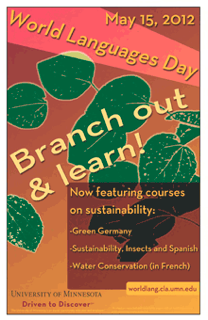
The World Languages Day courses are:
- French: Water Conservation and Ecology taught by Patricia Mougel
- German: Green Germany taught by Beth Kautz
- Spanish: Sustainability, Insects and Spanish taught by Frances Matos-Schultz
These classes will give high school students an opportunity to participate in a science-based content course taught in a second language.
These courses are highlighted on our 2012 poster, designed by Paul Fosaaen, our Multimedia Lab Lead Student, who is graduating at the end of this semester. Congratulations Paul!
In addition to designing the WLD poster, Paul is the artist of Mi Casta Su Casta, a piece hung in the Multimedia Lab.

Congratulations Bethany, Fulbright Scholar!
Bethany Schowengerdt, TandemPlus and World Languages Day Assistant, has been awarded a Fulbright English Teaching Assistant (ETA) grant to travel to Rwanda. From January to September 2013, she will serve as a teaching assistant at a university in Rwanda and also do volunteer work.
Bethany is graduating at the end of Spring 2012 with a double-major in Global Studies and French, and a minor in Teaching English as a Second Language. Her areas of concentration are Africa and the International Political Economy. While an undergraduate at the U of M, Bethany participated in a study abroad program in Senegal, and also served an internship at BestPrep, a non-profit that facilitates guest speaker presentations and an email exchange between high school students and business professionals.
We will always remember Bethany for her friendliness, positive energy, willingness to take on any task, and her commitment to second language education and student support. We wish her the best in her latest international endeavor!
Bethany is graduating at the end of Spring 2012 with a double-major in Global Studies and French, and a minor in Teaching English as a Second Language. Her areas of concentration are Africa and the International Political Economy. While an undergraduate at the U of M, Bethany participated in a study abroad program in Senegal, and also served an internship at BestPrep, a non-profit that facilitates guest speaker presentations and an email exchange between high school students and business professionals.
We will always remember Bethany for her friendliness, positive energy, willingness to take on any task, and her commitment to second language education and student support. We wish her the best in her latest international endeavor!
Thursday, April 26, 2012
World Languages Day: Schools Attending the 2012 Event
Registration for World Languages Day is almost complete, and we are pleased to welcome the following high schools to the event on May 15: Apple Valley, Austin, Blaine, Coon Rapids, Creative Arts, Floodwood, Melrose, Pine Island, Robbinsdale Cooper, Moose Lake, Prior Lake, South, St. Louis Park, Waconia and White Bear North.
Most students coming to the event study French, German or Spanish. There are also a few ESL, Hebrew and Japanese students expected, and some students are currently in advanced-placement or immersion programs.
Over 1000 students will be on campus for the event. You can see a list of classes at worldlang.cla.umn.edu.
Most students coming to the event study French, German or Spanish. There are also a few ESL, Hebrew and Japanese students expected, and some students are currently in advanced-placement or immersion programs.
Over 1000 students will be on campus for the event. You can see a list of classes at worldlang.cla.umn.edu.
Wednesday, April 25, 2012
TandemPlus Class-to-Class Exchanges in the Minnesota Daily
One of the missions of the Language Center's TandemPlus program is to support instructors in the establishment and management of class-to-class exchanges involving Skype. Courtney Johnson, a student in Trina Whitaker's hybrid French 1004 class, wrote a very insightful op-ed piece in the Minnesota Daily last week about her Skype exchanges with her partner in Troyes, France. Courtney described this as "a task that was hard for me to get outside of my comfort zone for, but it has been well worth it." She also said that "this interactive opportunity has opened the door to an entirely new way of learning about culture." We are thrilled to hear great stories like these.
Instructors: if you would like to arrange a class-to-class exchange with a school overseas, contact TandemPlus at tandem@umn.edu.
Instructors: if you would like to arrange a class-to-class exchange with a school overseas, contact TandemPlus at tandem@umn.edu.
Tuesday, April 24, 2012
Anna Kaminski Wins Inna Meiman Human Rights Award
On Friday, April 20, LC student staffer Anna Kaminski was presented with the second annual Inna Meiman human rights award from the Human Rights Program and the Center for Holocaust and Genocide Studies at the University of Minnesota in recognition for her outstanding human rights work. Kaminski, a junior majoring in Art, Global Studies and Social Justice, has been a tireless advocate of human rights, working abroad in 2011 with the Iraqi and American Reconciliation Project in Najaf, Iraq and domestically in 2011-2012 on the HeART show in Minneapolis.
Anna has been working at the Language Center for two years. Currently she is the TandemPlus assistant, but true to her generous and helpful nature, she also assists in the Main Office and Multimedia Lab.
Congratulations, Anna!
Anna has been working at the Language Center for two years. Currently she is the TandemPlus assistant, but true to her generous and helpful nature, she also assists in the Main Office and Multimedia Lab.
Congratulations, Anna!
Monday, April 9, 2012
TandemPlus: Mocktail Event
On Friday, April 20, TandemPlus will host its final get-together of the academic year. The Mocktail Happy Hour will take place from 4:30 - 6:30 p.m. at the Tea House restaurant on 2425 University Avenue SE, Minneapolis. Everyone who registered for TandemPlus this semester is invited for an afternoon of fun, food, and foreign languages!
Thursday, March 22, 2012
World Languages Day: Branch out and Learn!
While University of Minnesota students and faculty are counting down to various deadlines and the end of the semester, the World Languages Day planning committee continues the count-down to World Languages Day, and we can't wait! The event is scheduled for Tuesday, May 15, just two months away. We expect to draw over 1000 high school sophomores to campus.
This year, we are happy to see returning high schools from last year, from the Twin Cities metro area, as well as the northern, southern, and central areas of Minnesota. We also welcome new schools or schools that participated prior to 2011 representing a wide range of cities and town in Minnesota.
New teachers and students are in for a treat. Returnees will recognize perennial favorites on the course list, and will once again be able to learn traditional Hmong dance, greet each other in Italian, and play American Idol in German - and that's just the a small sampling of the offerings!
Reading over the course list is like flipping through a virtual travel catalogue, one that sparks cultural inquiry. Students can take Arabic Language and Culture: a Trip to Tunisia, Excursion Brazil, and A Virtual Walk through Vienna, all without leaving the U of M campus. For students who do want to leave campus, information on travel all over the world will be offered in three study abroad information sessions.
New this year will be the sounds of Afro-Cuban Music, a Spanish course which will include special musical guests. Experiencing the Chinese Language takes students on a journey through thousands of years of history. Classes such as the debut of From Atheists to Libertines: French Philosophy and the Limits of the Imagination challenge our assumptions in learning about other cultures and places, and the people we meet along the way.
There is also a cross-curriculum focus on sustainability offered this year: Water Conservation and Ecology (French), Sustainability, Insects, and Spanish, as well as Green Germany, each taught in the target language. Students will have the chance to apply their knowledge of science and the economy to their language studies in these different cultural contexts.
Take a look at our online course list for both new and proven ways to stretch imagination, broaden cultural knowledge, and express yourself in 23 different languages offered at World Languages Day this May.
In the meantime, the planning continues! Look out for more information on registration coming soon. You can view the class list, and learn more about the event at our website.
This year, we are happy to see returning high schools from last year, from the Twin Cities metro area, as well as the northern, southern, and central areas of Minnesota. We also welcome new schools or schools that participated prior to 2011 representing a wide range of cities and town in Minnesota.
New teachers and students are in for a treat. Returnees will recognize perennial favorites on the course list, and will once again be able to learn traditional Hmong dance, greet each other in Italian, and play American Idol in German - and that's just the a small sampling of the offerings!
Reading over the course list is like flipping through a virtual travel catalogue, one that sparks cultural inquiry. Students can take Arabic Language and Culture: a Trip to Tunisia, Excursion Brazil, and A Virtual Walk through Vienna, all without leaving the U of M campus. For students who do want to leave campus, information on travel all over the world will be offered in three study abroad information sessions.
New this year will be the sounds of Afro-Cuban Music, a Spanish course which will include special musical guests. Experiencing the Chinese Language takes students on a journey through thousands of years of history. Classes such as the debut of From Atheists to Libertines: French Philosophy and the Limits of the Imagination challenge our assumptions in learning about other cultures and places, and the people we meet along the way.
There is also a cross-curriculum focus on sustainability offered this year: Water Conservation and Ecology (French), Sustainability, Insects, and Spanish, as well as Green Germany, each taught in the target language. Students will have the chance to apply their knowledge of science and the economy to their language studies in these different cultural contexts.
Take a look at our online course list for both new and proven ways to stretch imagination, broaden cultural knowledge, and express yourself in 23 different languages offered at World Languages Day this May.
In the meantime, the planning continues! Look out for more information on registration coming soon. You can view the class list, and learn more about the event at our website.
Tuesday, March 20, 2012
Multilingual TV in the Multimedia Lab
The Multimedia Lab in Jones 135 has been streaming multilingual international TV since the beginning of Spring semester. Students can watch TV on the wall-mounted large-screen monitor and listen through wireless headphones while relaxing on the Lab's spacious and comfortable couch or lounge chairs.
Please inform your students of this fun, authentic and relaxing language learning opportunity. The schedule is http://languagecenter.cla.umn.edu/lab_tv.php.
Although we are not streaming French TV through the internet, we continue to receive the French satellite TV station TV5 every day.
Please inform your students of this fun, authentic and relaxing language learning opportunity. The schedule is http://languagecenter.cla.umn.edu/lab_tv.php.
Although we are not streaming French TV through the internet, we continue to receive the French satellite TV station TV5 every day.
The Digital Content Library (DCL): How to Video
Monday, March 5, 2012
Mackenzie Haws Wins Big Ten Network Award
Mackenzie, a Spanish student and Assistant Lead Student in the main office has won the 2012 Big Ten Network LiveBIG Scholarship for Outstanding Service award for her volunteer work in the Big Brothers Big Sisters program.
You can read about this awards, and see a picture of Mackenzie and her little sister with Goldie Gopher at UMNews.
You can read about this awards, and see a picture of Mackenzie and her little sister with Goldie Gopher at UMNews.
Friday, March 2, 2012
Dance, Dance, Bowl! TandemPlus Bowling Night
On Friday, February 24, TandemPlus hosted a Spring Bowling Night at Goldy's Gameroom in Coffman Union.
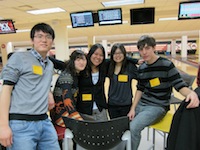
More than 30 CLA and international students came to bowl, play Dance Dance Revolution, enjoy some of Goldy's famous appetizers, and speak a variety of languages including Korean, Farsi, Arabic, Chinese, French, and English.
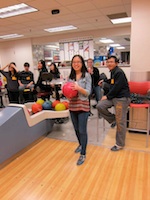
Students also engaged in lively cross-cultural dialogue about everything from politics to American pop culture and cinema. The event was a great success that reflected the amazing growth of the TandemPlus program over the past two semesters.
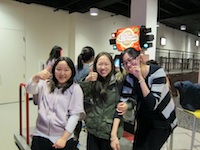

More than 30 CLA and international students came to bowl, play Dance Dance Revolution, enjoy some of Goldy's famous appetizers, and speak a variety of languages including Korean, Farsi, Arabic, Chinese, French, and English.

Students also engaged in lively cross-cultural dialogue about everything from politics to American pop culture and cinema. The event was a great success that reflected the amazing growth of the TandemPlus program over the past two semesters.

Tuesday, February 21, 2012
TandemPlus: Article in Minnesota Daily
The Tuesday, February 21, 2012 edition of the Minnesota Daily features an article on the TandemPlus program that includes interviews with the coordinators and student participants. You can read the article online or pick up a paper copy on campus.
Monday, February 20, 2012
Jones 35 Renovation: More Flexibility, More DiLL, No Laptop Fuss
The Language Center staff would like thank all instructors who participated in the recent survey of technology needs. An upgrade planning committee used the results of that survey, along with an examination of our classroom usage statistics, to develop a plan for the renovation of Jones 35. Both the survey and an analysis of our use indicate that the number one technology need is additional classroom space for student audio pairing and recording. Since the MacDiLL software used for most computer-based audio activities only runs on Mac computers, we are planing on replacing the Windows OS laptops with networked, desktop Macs. The layout of the renovated classroom will be more flexible than our existing MacDiLL classrooms, and the room will remain multifunctional.
We are planning to install 24 networked iMac computers around the perimeter of the classroom. The interior of the classroom will be outfitted with tables that can be easily moved to allow for a variety of classroom configurations. Chairs will serve both the perimeter computer workstations as well as the interior tables, leaving enough space for many configurations. This flexible layout will allow the room to be used as both a computer classroom, and as a space for presentations, lectures, and small group work that does not involve computers.
The room will retain videotaping capabilities, and we are investigating options for upgrading the recording equipment.
Our survey indicated that most instructors prefer Macs for classroom use, and a large percentage have no preference. While a smaller percentage of instructors stated a preference for Windows computers, the committee is aware that some instructors have a strong preference for the Windows platform, and we would like to provide the best accommodation possible. All of our Mac classroom computers can fully run the Windows operating system, and the survey results indicated that not all instructors were aware of this possibility. Please contact us if you would like more information on how Windows can run on our iMac computers, or if you have suggestions on what we might do to improve your students' experiences on a dual-booting computer.
We are very excited about this renovation, and look forward to unveiling a brand-new, multifunctional computer lab with lots of layout possibilities, and no laptop fuss, during summer 2012.
We are planning to install 24 networked iMac computers around the perimeter of the classroom. The interior of the classroom will be outfitted with tables that can be easily moved to allow for a variety of classroom configurations. Chairs will serve both the perimeter computer workstations as well as the interior tables, leaving enough space for many configurations. This flexible layout will allow the room to be used as both a computer classroom, and as a space for presentations, lectures, and small group work that does not involve computers.
The room will retain videotaping capabilities, and we are investigating options for upgrading the recording equipment.
Our survey indicated that most instructors prefer Macs for classroom use, and a large percentage have no preference. While a smaller percentage of instructors stated a preference for Windows computers, the committee is aware that some instructors have a strong preference for the Windows platform, and we would like to provide the best accommodation possible. All of our Mac classroom computers can fully run the Windows operating system, and the survey results indicated that not all instructors were aware of this possibility. Please contact us if you would like more information on how Windows can run on our iMac computers, or if you have suggestions on what we might do to improve your students' experiences on a dual-booting computer.
We are very excited about this renovation, and look forward to unveiling a brand-new, multifunctional computer lab with lots of layout possibilities, and no laptop fuss, during summer 2012.
Wednesday, February 1, 2012
TandemPlus Spring Kick-Off Event - Success!
On Friday, January 27, TandemPlus hosted its annual Spring kick-off event in 140 Nolte Hall. The event, attended by around 60 people speaking more than eight native languages, provided everyone with a chance to use their second-language skills in a fun, relaxing environment while enjoying refreshments.
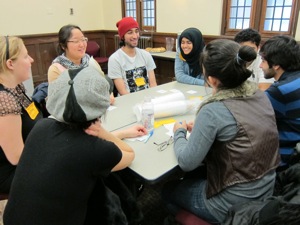
After a short introduction by TandemPlus informing attendees how to sign up for the program, students broke into small groups of 6-8 participants, each led by a native English speaker. They engaged each other during an activity discussing a variety of topics provided on small "TableTopics" conversation cards.
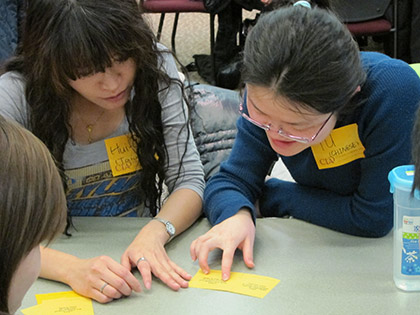
After this activity, conversation group leader James Katsev and TandemPlus assistant Anna Kaminski led a game of "University of Minnesota Taboo" created specially for the event. Students were divided into two teams and had to describe different aspects of the University of Minnesota without saying words deemed "taboo". This was extremely difficult at times but overall the game got a good laugh out of all in attendance.
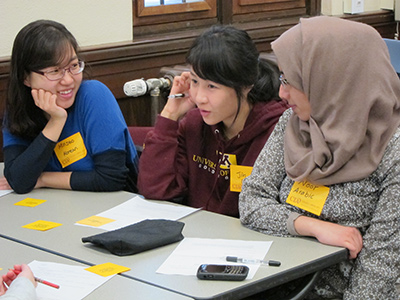
After this, a short and spirited round of karaoke was led by James Katsev, Anna Kaminski and French instructor Rick Treece.
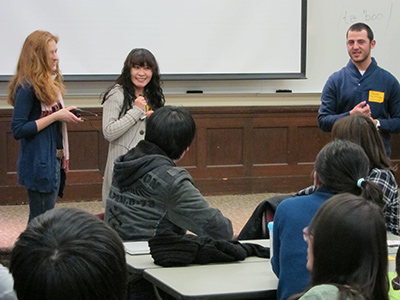
TandemPlus currently has 344 people registered for exchanges. We hope to keep growing over the next couple of weeks and possibly beat last semester's record of nearly 700 registrants!
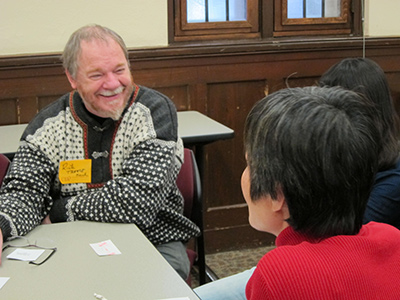

After a short introduction by TandemPlus informing attendees how to sign up for the program, students broke into small groups of 6-8 participants, each led by a native English speaker. They engaged each other during an activity discussing a variety of topics provided on small "TableTopics" conversation cards.

After this activity, conversation group leader James Katsev and TandemPlus assistant Anna Kaminski led a game of "University of Minnesota Taboo" created specially for the event. Students were divided into two teams and had to describe different aspects of the University of Minnesota without saying words deemed "taboo". This was extremely difficult at times but overall the game got a good laugh out of all in attendance.

After this, a short and spirited round of karaoke was led by James Katsev, Anna Kaminski and French instructor Rick Treece.

TandemPlus currently has 344 people registered for exchanges. We hope to keep growing over the next couple of weeks and possibly beat last semester's record of nearly 700 registrants!

Monday, January 23, 2012
Multilingual TV in the Multimedia Lab
The Multimedia Lab in Jones 135 now offers multilingual TV programming. Every day, Lab patrons can watch a variety of live streaming channels from around the globe on the Lab's big-screen television and listen through wireless headphones. Instructors: Be sure to tell your language students about this venue for real-time, authentic language learning.
Our TV schedule is available online.
In addition, the French TV station TV5 is available for viewing every day.
Our TV schedule is available online.
In addition, the French TV station TV5 is available for viewing every day.
Tuesday, January 17, 2012
Jones 35 upgrade: what technology do you require?
The laptop lab that can be used in Jones 35 is almost four years old, and due for an upgrade. Language Center staff have found that while our three fixed MacDiLL classrooms (Jones 10, 15 and 30) are increasingly in demand, Jones 35 and the laptop lab are under-utilized. We have also received many complaints about the length of time required to set up the laptop lab for classroom use. Therefore, we are considering a new layout for the room that would offer both flexible tables and some fixed computer stations.
Instructors: please help us plan for this upgrade by filling out this short survey of your technology needs and ideas. The survey will be open through Tuesday, January 24, 2012. We appreciate your assistance as we make this important decision
Instructors: please help us plan for this upgrade by filling out this short survey of your technology needs and ideas. The survey will be open through Tuesday, January 24, 2012. We appreciate your assistance as we make this important decision
Congratulations to the Language Testing Team!
The Language Testing Program team of Monica Frahm, Mary Norman, Joanne Peltonen, Gabriela Sweet and Sondes Wooldridge has won a 2012 CLA Outstanding Service Award. The work group was recognized for supporting the testing needs of over 7200 students each year, as well as for its role in the development of new computerized Language Proficiency Exams (LPEs) for critical and high-enrollment languages.
Thanks to the Testing Program staff, the full LPE development team, and the support of language instructors and departments, CLA students of Arabic, Chinese, Italian, Japanese, and Russian now have access to the same computerized proficiency exams as students of French, German and Spanish. In addition, there is a second version of the Spanish test available, and development is underway for computerized tests in Hmong, Finnish and Korean.
You can read more about the new LPEs at Elsie Speaks. The Outstanding Service Awards will be presented at the CLA Staff Appreciation Ceremony on January 24.
Thanks to the Testing Program staff, the full LPE development team, and the support of language instructors and departments, CLA students of Arabic, Chinese, Italian, Japanese, and Russian now have access to the same computerized proficiency exams as students of French, German and Spanish. In addition, there is a second version of the Spanish test available, and development is underway for computerized tests in Hmong, Finnish and Korean.
You can read more about the new LPEs at Elsie Speaks. The Outstanding Service Awards will be presented at the CLA Staff Appreciation Ceremony on January 24.
World Languages Day: Application to Attend 2012 Event
World Languages Day begins accepting Applications of Interest on January 17th, 2012!
What is an Application of Interest and why do we require it? Read on!
The origins of a fun language and culture event:
Interest from high school teachers to bring their students to attending World Languages Day has been growing ever since the event debuted in 2004. On the day of the event, approximately 1000 high school students visit the University of Minnesota campus to take three mini-courses on foreign language-related topics. Most of the courses are introductory and interactive and help get participants excited about continuing their study of a current language, or learning a new language.
Overwhelming popularity:
In 2009, after 1600 students enrolled for an event intended for 1000 students, we decided that we needed a new registration system. In 2010, we debuted the Application of Interest, along with a two-step registration process.
Organizing enrollment:
This January, interested teachers are invited to submit an Application of Interest to bring their students to attend the 2012 event. This application includes a short summary of the reasons they wish to bring their group to the event. If more teachers submit applications than we can accommodate, the planning committee selects which groups to invite. The goal is to bring as much geographic, linguistic and cultural diversity to the event as possible. We also give priority to schools who are underrepresented at the U of M and we place emphasis on sophomore-level classes, to ensure that we are reaching the best possible audience. Any groups that we are not initially able to accommodate are placed on a waiting list, and we are often able to invite some schools from the wait list.
In addition to the approximately 1000 students who attend the event in person, we will also accommodate some schools who wish to attend the event virtually and participate in interactive online classes.
This year's event is scheduled for May 15, 2012 and we will be accepting Applications of Interest from January 17 through January 31, 2012 at http://worldlang.cla.umn.edu/.
High school teachers on our email list have received a user name and password for the Application of Interest, and the application link will go live on Tuesday, January 17.
For more information about the event, please visit our website: worldlang.cla.umn.edu
or contact Stephanie Treat at treat002@umn.edu.
What is an Application of Interest and why do we require it? Read on!
The origins of a fun language and culture event:
Interest from high school teachers to bring their students to attending World Languages Day has been growing ever since the event debuted in 2004. On the day of the event, approximately 1000 high school students visit the University of Minnesota campus to take three mini-courses on foreign language-related topics. Most of the courses are introductory and interactive and help get participants excited about continuing their study of a current language, or learning a new language.
Overwhelming popularity:
In 2009, after 1600 students enrolled for an event intended for 1000 students, we decided that we needed a new registration system. In 2010, we debuted the Application of Interest, along with a two-step registration process.
Organizing enrollment:
This January, interested teachers are invited to submit an Application of Interest to bring their students to attend the 2012 event. This application includes a short summary of the reasons they wish to bring their group to the event. If more teachers submit applications than we can accommodate, the planning committee selects which groups to invite. The goal is to bring as much geographic, linguistic and cultural diversity to the event as possible. We also give priority to schools who are underrepresented at the U of M and we place emphasis on sophomore-level classes, to ensure that we are reaching the best possible audience. Any groups that we are not initially able to accommodate are placed on a waiting list, and we are often able to invite some schools from the wait list.
In addition to the approximately 1000 students who attend the event in person, we will also accommodate some schools who wish to attend the event virtually and participate in interactive online classes.
This year's event is scheduled for May 15, 2012 and we will be accepting Applications of Interest from January 17 through January 31, 2012 at http://worldlang.cla.umn.edu/.
High school teachers on our email list have received a user name and password for the Application of Interest, and the application link will go live on Tuesday, January 17.
For more information about the event, please visit our website: worldlang.cla.umn.edu
or contact Stephanie Treat at treat002@umn.edu.
Monday, January 9, 2012
Reserve Films and the DCL
Instructors: If you have films from your personal collection that you would like to share with students, the Language Center will place your films on reserve for students to check out and view in Jones Hall. However, many students find the necessity of viewing the films during business hours restrictive. We strongly encourage you to consider the Digital Content Library (DCL) as an alternative to placing films on reserve in Jones Hall.
In the case of subtitled films, the readability of the digitized version may be insufficient for some students, and in those cases, you may consider both putting the film on reserve, and having it digitized through the DCL.
You can check the DCL catalog and view films at: http://dcl.umn.edu/, and learn more about this service at Elsie Speaks.
In the case of subtitled films, the readability of the digitized version may be insufficient for some students, and in those cases, you may consider both putting the film on reserve, and having it digitized through the DCL.
You can check the DCL catalog and view films at: http://dcl.umn.edu/, and learn more about this service at Elsie Speaks.
Wednesday, January 4, 2012
Rachel Says Goodbye
After working for the Language Center on and off ever since I was a Freshman undergrad in 2003, I will be leaving the office in mid-January to pursue a full-time position as the French Coordinator for a non-profit educational organization, called Intercultural Student Experiences. I am excited about this opportunity, but I am sad to leave the Language Center, especially in the middle of World Languages Day planning. This was my second year as primary coordinator for World Languages Day, but I have helped out with the event dating back to its debut in 2004. However, I have no doubt that World Languages Day 2012 will be a success; Stephanie Treat, the previous primary coordinator, will continue planning as usual.
I have enjoyed the opportunity to work with all the staff, volunteers and participants of World Languages Day and I hope to cross paths again with you in the future.
If you have any questions or concerns about this year's event, please contact Stephanie Treat at WLD@umn.edu or at 612-626-6017
Thanks so much everyone!
Rachel Faynik Marbell
I have enjoyed the opportunity to work with all the staff, volunteers and participants of World Languages Day and I hope to cross paths again with you in the future.
If you have any questions or concerns about this year's event, please contact Stephanie Treat at WLD@umn.edu or at 612-626-6017
Thanks so much everyone!
Rachel Faynik Marbell
Subscribe to:
Comments (Atom)
© Regents of the University of Minnesota. All rights reserved. Equal opportunity educator and employer.
